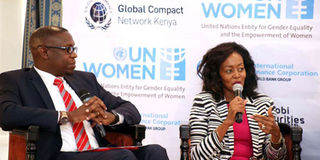Breaking News: KDF chopper crash kills five
Building democratic, inclusive Kenya vital

Left to right: Nairobi Securities Exchange chief executive officer Geoffrey Odundo and Kenya Association of Manufacturers chairperson Flora Mutahi participate in a gender equality event at Sarova Stanley, Nairobi, on March 7, 2017. Gender parity and an unambiguous human rights policy remain elusive. PHOTO | DIANA NGILA | NATION MEIDA GROUP
What you need to know:
- Political corruption and disregard of the rule of law remain serious barriers to implementing and enforcing the Constitution.
- Completive policy-based politics is a good sign of a healthy democracy.
Kenya is in a critical situation of trying to consolidate a fragile transition from decades of authoritarianism, macabre violence and promulgation of a constitutional order that creates devolved governance.
Concrete steps would be necessary to solidly address the deep-seated fragility and long-standing socio-political and economical grievances confronting the country, as well as re-evaluating the roles and functions of nascent constitutional social institutions that form the basis of securing political and social stability.
The 2010 Constitution established an era of democratic, ethical and transparent leadership with an obligation to promote democratic coexistence and societal tolerance of diversity and boost trust in public institutions’ capacity to deliver public good and social repair.
It also addresses itself to past governance malpractices.
GOVERNANCE
However, political corruption and disregard of the rule of law remain serious barriers to implementing and enforcing the Constitution, stalling the realisation of Kenyans’ dreams.
The government and the Opposition must acknowledge that a growing democracy is that which engages in constructive, inclusive dialogue.
Completive policy-based politics is a good sign of a healthy democracy.
It steers the country away from political, economic and social instability towards security, greater prosperity and genuine democratic governance.
COHESION
The future of a democratic, secure Kenya as a strong cohesive country depends on respecting and upholding the Constitution but building national cohesion and functional democratic institutions is a democratic progression requiring restraint, inclusivity and sobriety.
The initial stages of implementing the Constitution and creating a bridge between political actors and communities, a multi-stakeholders’ institutionalised dialogue with a clear roadmap of sustainability, implementation and accountability would see the country address key issues.
First, a sustainable strategy to enforce accountability, ethics and transparency would see raising the bar on the performance, integrity and credibility of State institutions and public officials.
REFORMS
Second, the country would agree on a solid strategy of a major overhaul, restructuring and transforming of broken dysfunctional and compromised security system organs.
Third, the dialogue would seek deepening, resourcing and consolidating devolved governance and framing the pillars of local economic development.
Fourth, the redefining and formulating new socio-economic policies that reflect the new constitutional realities and global changes.
Fifth, addressing comprehensively the land reforms and accessibility of land resources fairly by all citizens is key pillar of transforming Kenya.
GENDER PARITY
Sixth, Kenya cannot play a pivotal role and compete effectively globally if it does not bring about major changes in its education and health care systems.
Seventh, well-grounded forward-looking foreign policy that advances strategic trade, economic and security interests.
Finally, gender parity and an unambiguous human rights policy remain elusive.
It is imperative that consensus is built on implementation of policy structural shifts necessary to realise the conditions for generational equity, gender equality and the fulfilment of human rights as set out in the Constitution.
Mr Wainaina is executive director, International Centre for Policy and Conflict, a Nairobi-based independent regional not for profit research, education and advocacy, larger human rights, human security and democratic development institute. [email protected].




